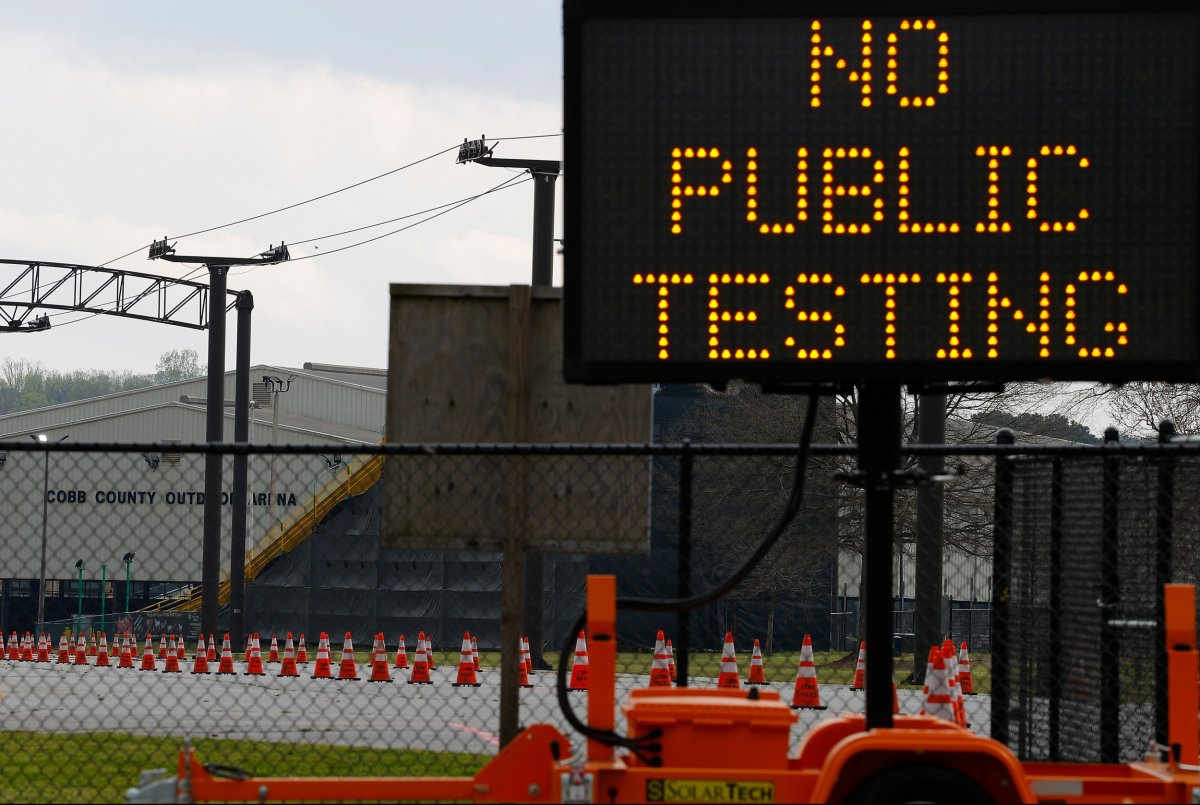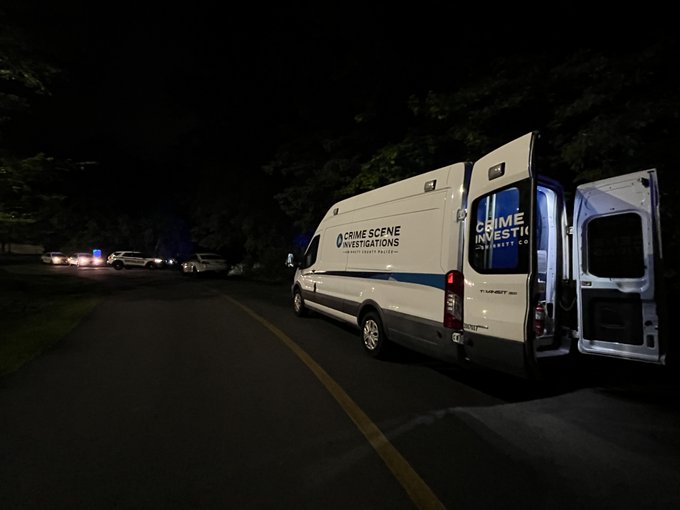Georgia Gov. Brian Kemp said he wasn't aware that asymptomatic people could transmit coronavirus as he announced he was preparing to issue a state-wide shelter-in-place order.
Kemp had resisted imposing tougher measures to tackle the pandemic, but on Wednesday he joined other Republican governors including the leaders of Florida and Mississippi in announcing he would sign a stay-at-home order. The order, which he said he would sign on Thursday, will go into effect on Friday.
Georgia has 4,638 cases of COVID-19, the disease caused by the new coronavirus, spanning 139 counties with 139 deaths as of midday Wednesday, Kemp said.
He said his decision to issue the shelter-in-place order came after he found out that people could transmit the virus before they started showing symptoms.
A stunning admission of deadly ignorance from Georgia Gov. Brian Kemp, who says he only just learned that asymptomatic people can transmit #Covid19. “[I]ndividuals could have been infecting people before they ever felt bad, but we didn’t know that until the last 24 hours.†pic.twitter.com/T7NZWk2GDR
— Andisheh Nouraee (@andishehnouraee) April 2, 2020
In a bizarre turn of events, information the rest of the nation had in January didn’t reach Georgia Governor Brian Kemp until April: “Individuals could have been infecting people before they ever felt bad, but we didn’t know that until the last 24 hours.” https://t.co/v1nGdzTy5y
— Shannon Watts (@shannonrwatts) April 2, 2020
"The reason I'm taking this action, like I've continued to tell people, I'm following the data, I'm following the advice of Dr. [Kathleen] Toomey," Kemp said in response to a reporter's question at a press conference on Wednesday.
"Finding out that this virus is now transmitting before people see signs, so what we've been telling people from directives from the CDC for weeks now that if you start feeling bad, stay home... those individuals could've been infecting people before they ever felt bad. But we didn't know that until the last 24 hours. And as Dr. Toomey told me, this is a game changer for us."
Kemp's remarks prompted shocked reactions on Twitter, with Shannon Watts, the founder of Moms Demand Action, noting: "In a bizarre turn of events, information the rest of the nation had in January didn't reach Georgia Governor Brian Kemp until April."
Andisheh Nouraee added: "A stunning admission of deadly ignorance from Georgia Gov. Brian Kemp, who says he only just learned that asymptomatic people can transmit #Covid19."
Georgia governor @BrianKempGA just found out asymptomatic people can shed the virus. What planet has this guy been on the last couple months? How could he just be learning this? How? https://t.co/rOsizMzmh8
— Leilani Münter (@LeilaniMunter) April 2, 2020
GA Governor Brian Kemp had no idea people with no symptoms could still pass on the virus.
— Bobbie Oliver GreatestHitsOnAmazonPrime (@thebobbieoliver) April 2, 2020
Luckily for Georgians, stupidly isn’t contagious.
Leilani Münter wrote: "Georgia governor@BrianKempGA just found out asymptomatic people can shed the virus. What planet has this guy been on the last couple months? How could he just be learning this? How?"
Bobbie Oliver, a comedian from Athens, Georgia, added: "GA Governor Brian Kemp had no idea people with no symptoms could still pass on the virus. Luckily for Georgians, stupidly isn't contagious."
Researchers and health officials have long said that coronavirus can be transmitted by carriers before they show symptoms or those who don't ever show symptoms. The U.S. Centers for Disease Control and Prevention (CDC) has said that virus has a long incubation period and symptoms may appear between two and 14 days after infection.
After a case of coronavirus was detected at a long-term care facility in King County, Washington, 76 residents were tested. Twenty-three residents tested positive but around half were asymptomatic or not showing symptoms on the day they were tested, the CDC reported last month.
But Dr. Robert Redfield, the director of CDC, recently said that new data about the high rates of this type of transmission could lead to the agency recommending the broadened use of face masks.
Both the World Health Organization and CDC have repeatedly advised that only people who have symptoms need to wear masks to prevent spreading the virus.
On Monday, Dr. Redfield said in an interview with WABE in Atlanta, that the guidance on who should wear masks was being "aggressively reviewed" and said that as many as 25 percent of infected people don't show symptoms. Some people are transmitting the virus for up to two days before showing symptoms, he told the station.
"This helps explain how rapidly this virus continues to spread across the country, because we have asymptomatic transmitters and we have individuals who are transmitting 48 hours before they become symptomatic," he said.

World Health Organization advice for avoiding spread of coronavirus disease (COVID-19)
Hygiene advice
- Clean hands frequently with soap and water, or alcohol-based hand rub.
- Wash hands after coughing or sneezing; when caring for the sick; before, during and after food preparation; before eating; after using the toilet; when hands are visibly dirty; and after handling animals or waste.
- Maintain at least 1 meter (3 feet) distance from anyone who is coughing or sneezing.
- Avoid touching your hands, nose and mouth. Do not spit in public.
- Cover your mouth and nose with a tissue or bent elbow when coughing or sneezing. Discard the tissue immediately and clean your hands.
Medical advice
- Avoid close contact with others if you have any symptoms.
- Stay at home if you feel unwell, even with mild symptoms such as headache and runny nose, to avoid potential spread of the disease to medical facilities and other people.
- If you develop serious symptoms (fever, cough, difficulty breathing) seek medical care early and contact local health authorities in advance.
- Note any recent contact with others and travel details to provide to authorities who can trace and prevent spread of the disease.
- Stay up to date on COVID-19 developments issued by health authorities and follow their guidance.
Mask and glove usage
- Healthy individuals only need to wear a mask if taking care of a sick person.
- Wear a mask if you are coughing or sneezing.
- Masks are effective when used in combination with frequent hand cleaning.
- Do not touch the mask while wearing it. Clean hands if you touch the mask.
- Learn how to properly put on, remove and dispose of masks. Clean hands after disposing of the mask.
- Do not reuse single-use masks.
- Regularly washing bare hands is more effective against catching COVID-19 than wearing rubber gloves.
- The COVID-19 virus can still be picked up on rubber gloves and transmitted by touching your face.
Uncommon Knowledge
Newsweek is committed to challenging conventional wisdom and finding connections in the search for common ground.
Newsweek is committed to challenging conventional wisdom and finding connections in the search for common ground.
About the writer
Khaleda Rahman is Newsweek's Senior News Reporter based in London, UK. Her focus is reporting on abortion rights, race, education, ... Read more
To read how Newsweek uses AI as a newsroom tool, Click here.






